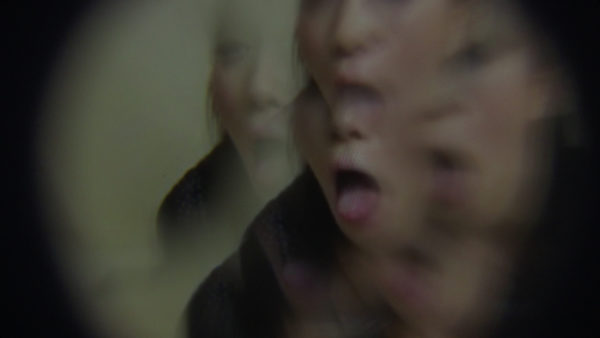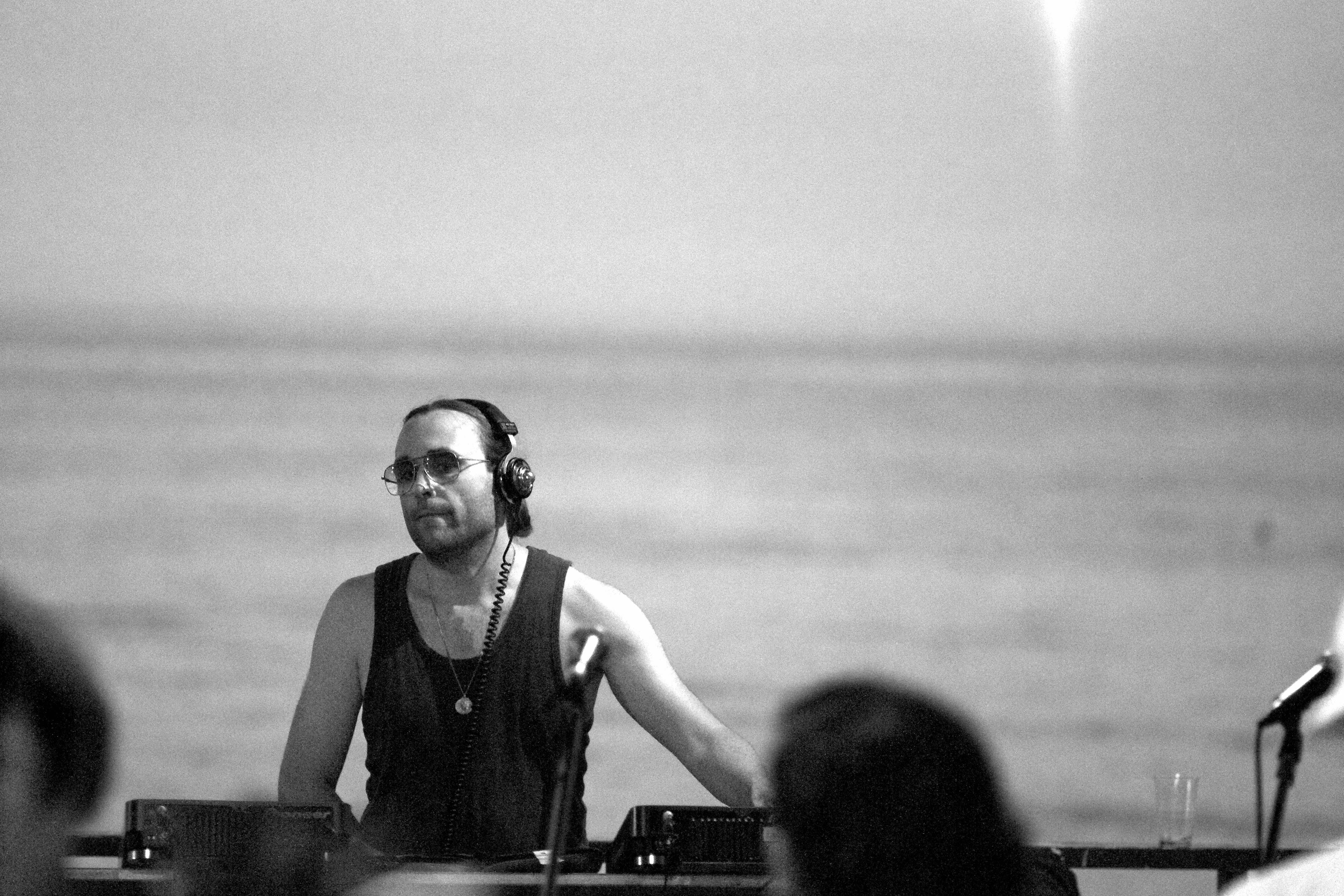*All photos courtesy of Comatonse Recordings.
Terre Thaemlitz is an intriguing enigma in art and music as a multi-disciplinary artist, musician, critic, DJ and academic with extensive work in all those fields coming together under one vision: “a critical look at identity politics – including gender, sexuality, class, linguistics, ethnicity and race – with an ongoing analysis of the socio-economics of commercial media production.” As a DJ and producer, the Fagjazz sound she established through her Comatonse label in the nineties, has cemented a legacy in electronic music with close associations to the Deep House and Ambient genres. As a multimedia artist she creates provocative audio/visual works to the critical acclaim of audiences and peers alike with a strong conceptual framework bolstering her execution.
Last week Terre Thaemlitz spoke to gallerist and writer Ruby Paloma about the concept informing her latest work “Deproduction” and the relationship her works share with each other. Thaemlitz also shared her views on some of the problems precipitating from artistic institutions and her “extreme issues with Pride[TM]”. In her answers she also sheds a brief light on her musical upbringing and how she might approach music and her multimedia works like “Deproduction”. We take up the conversation after Thaemlitz makes clear her views on the artistic and cultural hierarchy and Ruby posing more universal questions about the artist’s work and career. Again we get some unexpected insights into Thaemlitz’ musical upbringing and her nihilistic approach to art and music.
Terre Thaemlitz presents Deproduction at Kunstnernes Hus this Friday before assuming her DJ moniker for Frædag invites DJ Sprinkles.
Could you talk about what the main problem/ concern is in your practice? This could be related to form, theme or philosophy. Is this constant or has it changed over time?
Although I would not want people to presume there is a teleological course to my projects, I guess a common thread would be the anti-essentialist and anti-spiritual deconstruction of issues of authenticity and originality in any form or aspect of life.
You consider yourself a nihilist. Does this affect your ‘sound’ as much as it affects the conceptual framework of your projects?
Certainly not in the cliche sense that something “nihilistic” must sound “dark.” For me, a queer relationship to sound has more to do with cultural limitations than possibilities. For example, growing up as a queer in the US countryside, I had limited access to different styles of music. So my sense of how certain genres or songs took on queered meanings was grounded in the fact that I was mostly stuck listening to the same shit music cherished by the assholes fagbashing me. It wasn’t about an “authentically queer sound,” but rather a “queered relationship to mainstream sound.” I think this is also a huge part of the MTF transgendered stage – drag shows – and our fascination for performing or lipsyncing to pop songs that are more related to the experiences from which we have been historically excluded, and less related to the experiences we live. This tension is also where I think a lot of trans sarcasm, snarkyness and shade come from. So for me, this is the nihilistic subtext to many queered and trans applications of sound. It is not a “sound” in itself, but a broken relationship to a sound’s dominant and intended purposes.

In Deproduction, you discuss how much current LGBTQ politics is centred on same-sex marriage and the institution of the family in general. Your two premises: That having children is unethical, and That families make democracy impossible, resonates with the work of anti-natalist philosophers such as David Benatar, Sarah Perry or Thomas Ligotti. David Benatar believes that life is not good, and that people only imagine it to be, and that there is little purpose in rearing children in such a climate. In the Republic, Plato suggested that parents should be prohibited from raising their own children and even residing in the same vicinity as their children in order to preserve equality and avoid personal possession. Could you discuss Deproduction in relation to these or similar philosophical arguments? And what does Deproduction contribute to this line of philosophy?
Yes, this is all obvious stuff to many people, including many who have children. I mean, when working on “Deproduction” I had a lot of input from friends with children who were capable of the honestly required to speak about these things, so it is a common mistake for people to presume the only people thinking about these things are easily dismissible “childless freaks” who “don’t get it” because we don’t have kids. My project has been dismissed in the press many times as a didactic rant against having children, when in fact it is about investigating what it culturally means to breed. I see breeding as an inevitability of animal life, so the question of how something is “ethical” or “unethical” is a cultural issue through which we attempt to make sense of that inevitability. The ability to choose not to have children is not as easy as people think, and in many cultures is still an impossibility. Most women have no choice. Most men have no choice. It is the only way to be recognized as adult women and men. Even in the US, access to abortion is continually limited by the Rightists. And this lack of access greatly informs the general population’s sense of ethics around child bearing. In contexts where women wishing to terminate pregnancies have no options but to disobey very “morally motivated” laws and place their bodies at undue risk, of course it culturally aligns birth control and abortion with “immorality.” That violence against women is a large part of what I consider the “unethical” circumstances that most children are born into. More broadly, I think this world is incredibly violent and miserable in so many ways, and the more compassionate thing is to avoid imposing it onto another human being without their having any say in the matter. I don’t think I contribute anything new or special to the arguments of others, but maybe the format of my project as an audio album brings a certain language and outlook on this topic to a different audience than the audiences of the people you mention. Although I guess I do continually relate these issues to the cultivation of queer and trans experiences – and what our experiences mean in relation to dominant cultural ethics – which is not something discussed by all of those others. As with most of my projects, I try to speak through a voice centered in queer and trans experiences – even if some people feel a topic like having children initially appears more “relevant” to straight culture. Like, I’ve had some people tell me I should have left out the bits on queer and trans experience – even some queers told me that. For me, that presumption of the discussion being better served by targeting straights is an erasure of our very experiences which testify to the non-universality and violence of dominant heteronormativity – queer and trans experiences.

You discredit positivity and argue that negativity is ‘an indispensable act of any cultural endeavour that frames itself as critical’. Do you have any philosophical, artistic or musical influences that have lead you to take this position? And when did negativity become important in your work?
o The Italian Marxist philosopher and politician Antonio Gramsci had the motto: Pessimism of the Intellect, Optimism of the Will. “Pessimism of the intellect” means to see the world as it is, rather than as what we would like it to be or as we fantasise. To accept nothing at face value, to doubt all that we are told, and to question everything. “Optimism of the Will” is not meant as religious faith but is based on historical realities and the fact that the application of human ingenuity, if you want, and struggle, is what brought us from pre-civilisation to civilisation. Do you believe in the Optimism of the Will, Terre?
No, I do not believe in teleology or humanity being on a path of progress, etc. I think there is a very insect-like dynamic to social change. In a way, it spreads like a hornet’s nest. Have you ever seen a nest that fills an entire old barn or shed? There is a point where the nest’s growth takes on a complexity and momentum that seems unstoppable. I imagine from the perspective of larvae hatched and nursed at the deepest, hottest core of that nest it appears inevitable. The nest becomes the known world. For me, Optimism of the Will is simply an ideological byproduct of that kind of complexity and momentum. It’s ideological function is to conceal our ongoing relationships to slavery. For example, today it is the slavery of exported and underpaid or unpaid labor required to facilitate First World lifestyles of excess. Under globalization, the majority of slavery is displaced to the edge of the nest, and therefore appears nonexistent to those at the core.
 Meanwhile, even at the core, we in the First World internalize a slave ethic of mandatory participation in labor until old age. There is an insistence that we all “socially contribute” (in terms that dominant culture recognizes as contribution), and an incredible pressure not to “exploit” or rely upon the few social services that are available to us. Those who cannot earn enough to afford living in a First World culture are socially punished, sued, evicted, deported or incarcerated. Those who refuse to work are the most dreaded of all. Non-participation is such a taboo that the majority of us immediately rule it out as a possibility – yet who among us ever asked to be born into this shit world? Again, the sophistication and complexity of this hornet’s nest makes our own slavery appear to be something else. Something distant in time or location, or perhaps even something that has been overcome. This is delusion. And even if one refuses to identify one’s own working ethic as rooted in a model of slavery, any realist should easily be able to list off at least two or three types of unquestionable slavery within their own local economy. Just start by identifying the types of labor available to people without proper legal status or protections. Sex work is an easy one to get the list going… Meanwhile, how many “democracies” continue to have royal families? I believe that is also part of the Nordic Model.
Meanwhile, even at the core, we in the First World internalize a slave ethic of mandatory participation in labor until old age. There is an insistence that we all “socially contribute” (in terms that dominant culture recognizes as contribution), and an incredible pressure not to “exploit” or rely upon the few social services that are available to us. Those who cannot earn enough to afford living in a First World culture are socially punished, sued, evicted, deported or incarcerated. Those who refuse to work are the most dreaded of all. Non-participation is such a taboo that the majority of us immediately rule it out as a possibility – yet who among us ever asked to be born into this shit world? Again, the sophistication and complexity of this hornet’s nest makes our own slavery appear to be something else. Something distant in time or location, or perhaps even something that has been overcome. This is delusion. And even if one refuses to identify one’s own working ethic as rooted in a model of slavery, any realist should easily be able to list off at least two or three types of unquestionable slavery within their own local economy. Just start by identifying the types of labor available to people without proper legal status or protections. Sex work is an easy one to get the list going… Meanwhile, how many “democracies” continue to have royal families? I believe that is also part of the Nordic Model.
One could argue that there is a strong sense of antipathy in your video work, in some of your Terre Thaemlitz electro-acoustic projects and in your performances (I am not thinking of your DJ sets as DJ Sprinkles here). At times, this antipathy is experienced as non-violent aggression and as an attack on your audience. Could you talk a little bit about this?
I suppose the “attacks” you are referring to are simply the affect and discomfort associated with having one’s principles challenged? I think this is an unavoidable aspect of criticisms of homogenization, essentialism and heteronormativity.
Is your artistic and moral awareness, and to some extent asceticism, not only a means to overcome a frustration-filled and painful human condition, but also a means to reflect on the meaning of life?
Oh, come on, life is meaningless. Who wants to devote energy to such an obviously misdirected topic, when there are so many real things to reflect upon? [Laughs.] I take issue with this term “overcome” as well. I recognize change, but do not think we – as a quite shitty animal – have a capacity to overcome or transcend violence. Recognizing that inability is a starting point for other, non-teleological analyses related to how to cope with or organize through unending struggle and resistance.
What you do as Terre Thaemlitz is intrinsically linked to you as a person, which will undoubtedly follow you when you assume the role of DJ Sprinkles. Do you feel that these two aspects of your artistic personality are indeed linked? And if so, how do you distance yourself or draw yourself closer to your work as Terre Thaemlitz in your releases and work as DJ Sprinkles?
I guess what you are identifying as “intrinsically linked to me as a person” is about my insistence upon inserting the subjective within cultural analyses? This is a way of stopping oneself from falling into the classically “neutral” or “objective” voice of high Modernity and classic analytical methods. It is also about oral traditions, storytelling, and other non-traditional ways of speaking analyses.
My producing under various aliases, and in multiple genres, is similarly a rejection of the Modernist model of an “artist” or “musician” speaking from a singular voice, with their work manifesting a linear path of development over time. You know, like mapping Picasso or Bob Dylan’s evolution over time. Again, that is a high Modernist, teleological means of approaching “creativity” in the patriarchal public sphere. Metaphorically, my schizophrenia of personas and productions parallels the schizophrenia of my experiences with gender and sexuality. The decentralization of a singular voice is meant to mirror the decentralization of those and other social dynamics, as I perceive and experience them being culturally imposed from different vectors, in ways that are simultaneous and contradictory.
And finally, which of your works (including your writing) do you find has had the greatest impact? And which has had the greatest impact on you?
That first question is way too lofty for me. I’d have to say, “none.” As for the latter, “Soulnessless” was definitely the most complex and difficult project to realize, both in terms of personally thinking through the themes as well as the social interactions involved.

